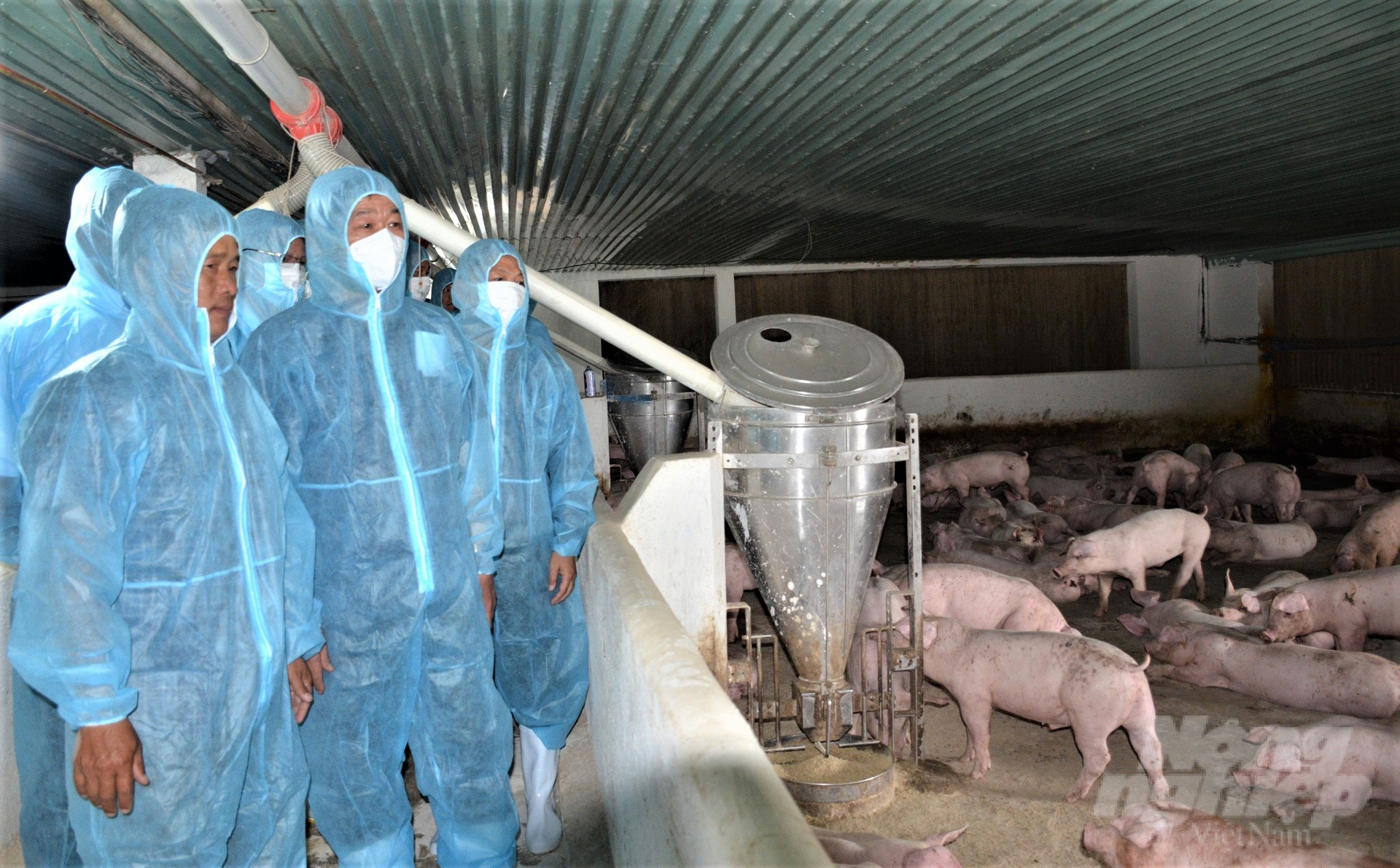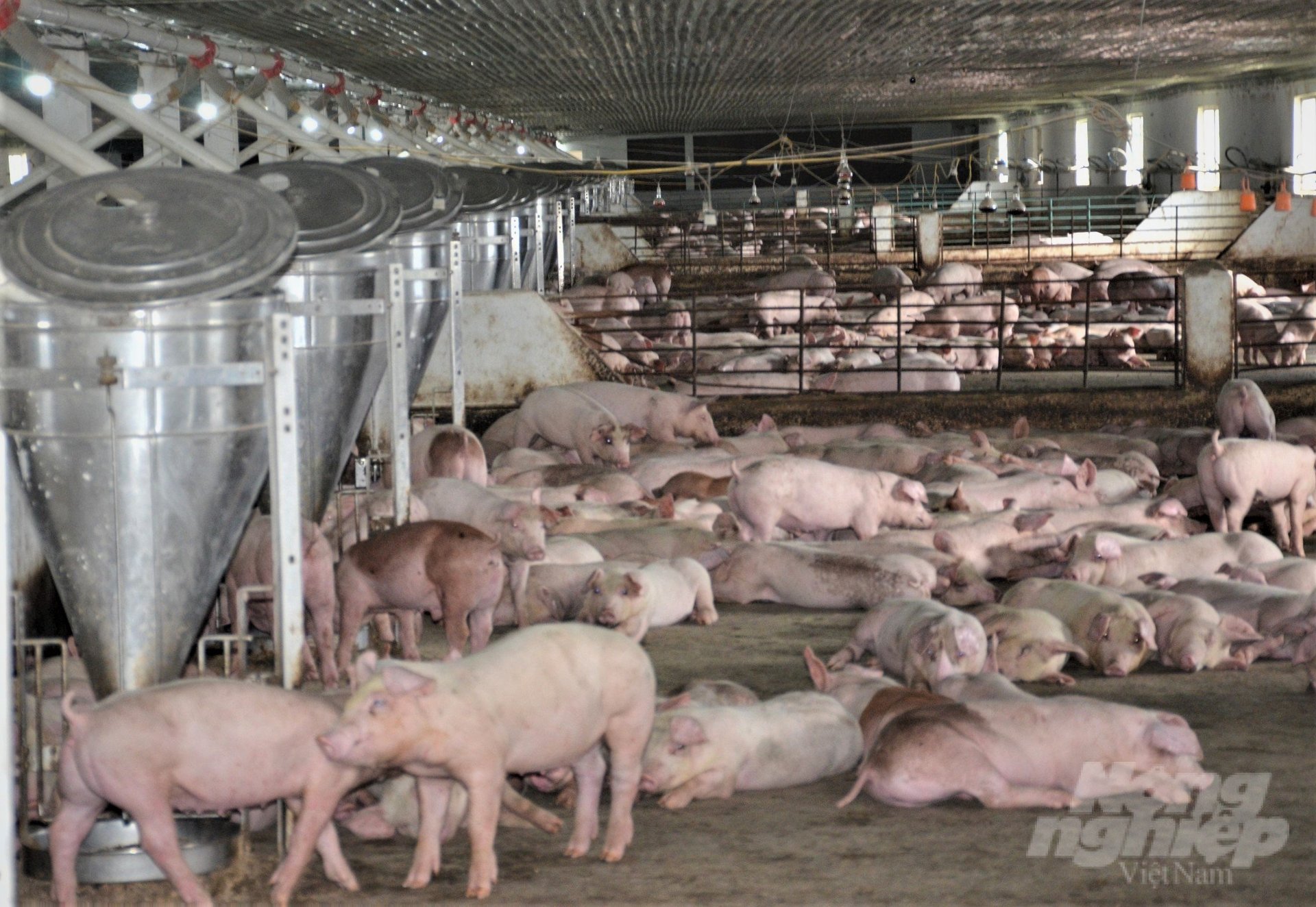May 18, 2025 | 08:30 GMT +7
May 18, 2025 | 08:30 GMT +7
Hotline: 0913.378.918
May 18, 2025 | 08:30 GMT +7
Hotline: 0913.378.918

Leaders of Kien Giang province visited a concentrated pig farm in a closed chain in Giang Thanh district. Photo: Trung Chanh.
Kien Giang is a province with a large arable land area and diverse agricultural production, creating a rich source of food materials for livestock development, especially pig and cattle farming.
In the past, for generations, farming households relied on raising a select few pigs, buffaloes, and cows to not just sustain themselves but also tap into the abundant food resources available midst the vast landscapes. This practice served the dual purpose of ensuring a regular food supply for the family while also bolstering their income through the sale of excess animals or their byproducts. However, in recent years, a significant decline in the prevalence of smallholder farming has been witnessed, marking a notable departure from the long-standing tradition.
Mr. Nguyen Thanh Duc, Director of Kien Giang Department of Animal Husbandry and Veterinary Medicine said, the province identifies farms as an important resource to grow herd size and increase production value. This is also an area where the province still has much room for development. Therefore, it is necessary to pay attention to investment and proper support in terms of resources, mechanisms, policies, investment and business procedures...
Recently, the agricultural sector of the province has worked with a number of large investment enterprises in the livestock sector such as: C.P, Mavin, CJ... about the breeding plan, orientation and strategy of the unit in Kien Giang in order to Determine the focus and resources to strongly develop the pig herd, aiming to achieve the annual herd growth target of Sustainable livestock development project of the province.
Develop concentrated livestock production in chains or chain links from farm to consumption. Especially businesses with closed chains or links from breeds, feed, farms, distribution, and consumption according to the 3F chain (Feed - Farm - Food).
Thereby, making an important contribution to the development of the province's livestock industry, exploiting the potentials and strengths of some localities that still have room for land funds and rich sources of feed ingredients such as Giang Thanh, Kien Luong and Hon Dat districts.
The Kien Giang Veterinary Sector actively cooperates with districts and cities to strengthen the work of supplementing vaccinations with vaccines for cattle, poultry, and livestock, providing free Benkocid chemicals to farmers to clean livestock barns.
Concentrating resources, and solutions to control the risk of African swine fever, avian influenza and skin rash on buffaloes and cows.

Farming concentrated on a 3F closed chain is an important resource to increase the size of the herd and has a lot of room for development in Kien Giang province. Photo: Trung Chanh.
Support and replicate the investment model of livestock development in the direction of farms and industry, focusing on developing advantageous livestock such as pigs, cows, and poultry. Diversify livestock types to promote the advantages of each region and the diverse needs of each market, applying biosafety, food safety and good husbandry practices - (VietGAHP) breeding processes.
Currently, in Kien Giang province, there are large enterprises investing in developing livestock farms such as C.P Livestock Joint Stock Company. Vietnam - Kien Giang Branch, Mavin Group, C.J Vina Agri Company, Techpal Joint Stock Company.
In addition, there are many farms of livestock farmers processing livestock for businesses according to a closed process, ensuring biosecurity and being provided with timely information about disease developments, proactively responding and maintaining good livestock farming activities. Large livestock farms currently supply 20,000 - 30,000 pigs/month to the market in the province. Developing concentrated farms in farming has helped Kien Giang province's pig population increase after a sharp decline due to the impact of African swine fever. Striving to the end of 2023, the pig herd will reach from 251,000 to 266,000 heads, an increase of about 15% compared to 2022.
Dong Nai will support livestock-raising households and small-scale farms with relocation costs of VND 4 million/facility, and medium-scale and large-scale farms are supported with relocation costs of VND 6 million/facility.
Regarding investment loans for new livestock projects, 100% of the loan interest rate according to the loan contract will be supported for the first 2 years and 50% of the loan interest rate in the 3rd year. The interest rate support for 3 years must not exceed VND 300 million for large-scale farms, VND 150 million for medium-scale farms, and VND 60 million for small-scale farms.
Translated by Hoang Duy

(VAN) 14 out of 35 domesticated elephants in Dak Lak province have had their living conditions improved, with 11 of them currently participating in the non-riding elephant tourism model.

(VAN) Muong Nhe Nature Reserve hopes that being upgraded to a national park will lay the foundation for forest protection efforts to be carried out in a systematic, modern, and sustainable manner.
/2025/05/16/3923-2-171845_52.jpg)
(VAN) Lower costs, higher yields, and improved soil quality are outstanding benefits that soybeans bring when integrated into the crop rotation system.

(VAN) The 'For a Green National Environment' programme aims to promote a green lifestyle, support businesses in implementing ESG practices, and turn Net Zero commitments into concrete actions.

(VAN) Cold-barn systems efficiently manage environmental and temperature conditions, which aids in the prevention of respiratory diseases in pigs and protects them from the vectors that transmit African swine fevers.

(VAN) To tackle challenges, the project 'Addressing key technical bottlenecks in the grouper supply chain in Vietnam' has been underway since 2024.

(VAN) The project 'Disease-Resilient and Sustainable Cassava Production Systems in the Mekong Region', funded by the Australian Center for International Agricultural Research (ACIAR), is being implemented from 2024 to 2028.